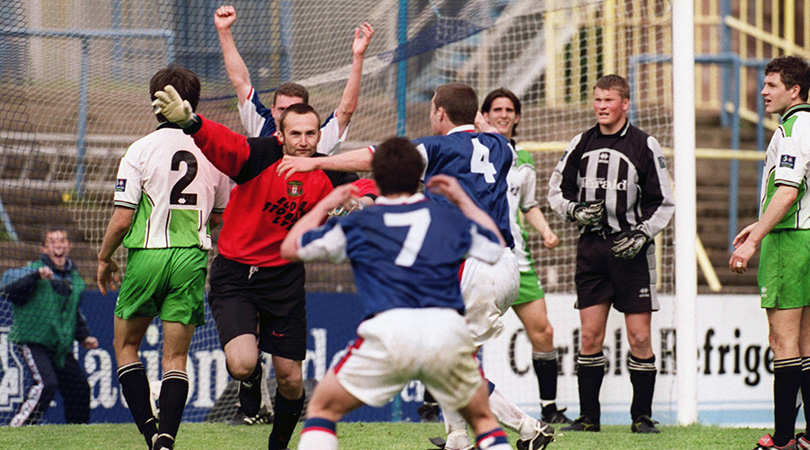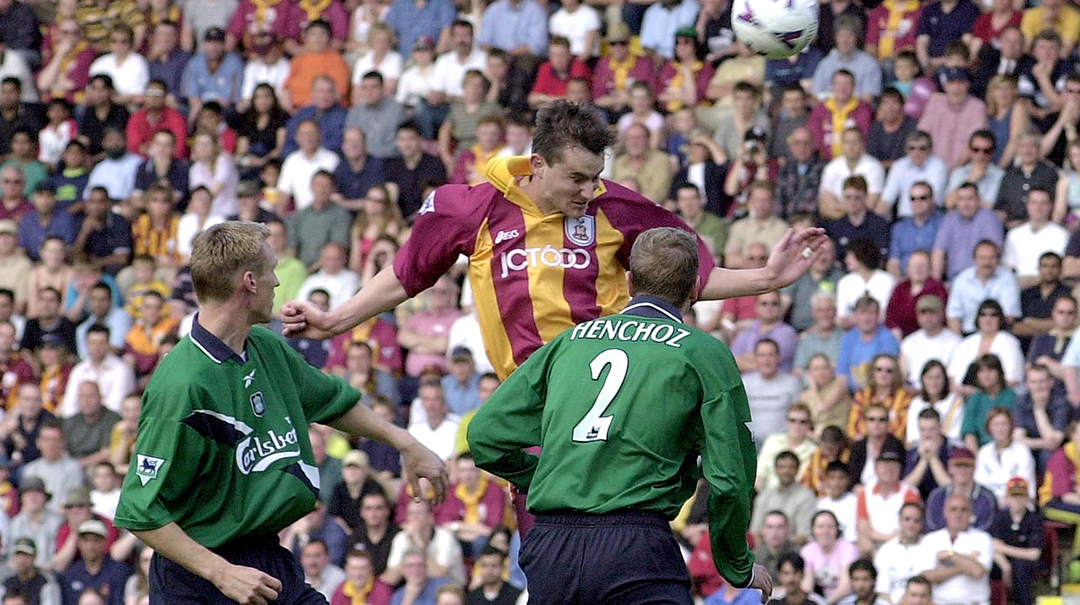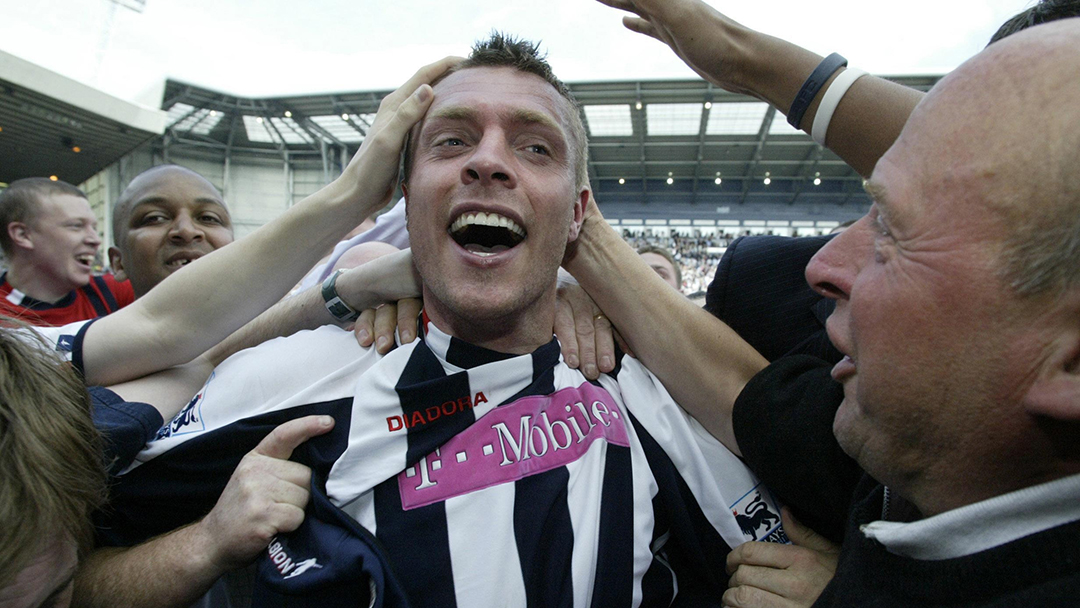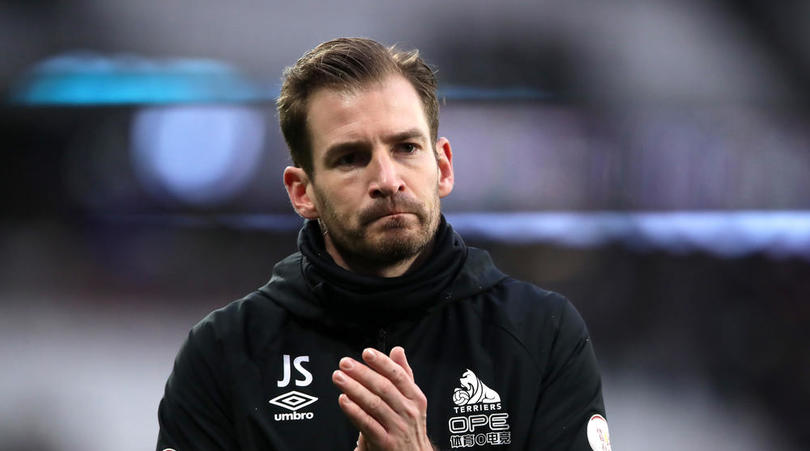The 11 most miraculous relegation escapes in English football
Huddersfield could break records by being relegated this weekend. But could they do something even more incredible? Jon Spurling recalls the teams who memorably defied the drop...

Luton, 1982/83
"It's my most calamitous day at Manchester City," admitted ex-Sky Blues player Dennis Tueart, after seeing his team relegated to Division Two on the final day of the 1982/83 season following a 1-0 home defeat to Luton Town. "Maine Road was like a mausoleum, and the players were silent afterwards."
City's loss was newly promoted Luton's gain. Before their dramatic showdown, the mathematics were simple: win or draw, and favourites City were safe.
Lose to the visitors, and they'd go down while David Pleat's team would survive. A tense and nervous encounter, City were unsure whether to grind out a point or kill off the Hatters. They did neither. With five minutes remaining, Luton's Yugoslav substitute Raddy Antic drove the ball home through a crowd of City players, and John Benson’s team were sunk. "I think we're going down," admitted comedian Eddie Large, sat in the City dugout. He was right, and bemused Match of the Day viewers watched David Pleat's celebratory jig across the Maine Road turf in his natty early ‘80s beige suit.
Coventry, 1984/85
During their 32-year residency in the top flight, Coventry had close shaves with relegation in both 1977 and 1997, but arguably their greatest escapology act came in 1985: the Sky Blues needed to win their final three games to stay up at the expense of Milk Cup winners Norwich, who had wrapped up their season with victory against Chelsea and sat eight points ahead.
Single-goal wins against long-since-relegated Stoke and another at mid-table Luton brought them to within two points of the Canaries, but surely City's luck would end at Highfield Road against champions Everton.
Get FourFourTwo Newsletter
The best features, fun and footballing quizzes, straight to your inbox every week.
Remarkably, goals by Micky Adams, Terry Gibson and a double from Cyrille Regis steered City to a 4-1 win in front of a delirious Highfield Road crowd against the over-relaxed Toffees.
Norwich, who sank like a stone after their Wembley victory, went down. Coventry survived by a point.
Torquay, 1986/87
Trailing 2-1 to Crewe with only minutes remaining of their final game, Torquay were heading out of the Football League and – according to their chairman – into “financial oblivion”.
At that point, fate intervened in the most unexpected of ways, when a police dog named Bryn ripped a chunk of flesh out of Jim McNichol’s thigh – for which the Torquay defender required 17 stitches.
The game was held up for four minutes, “but it gave my team-mates time to regroup and reorganise themselves,” explained McNichol. With the referee about to blow his whistle, Torquay equalised – in the fourth minute of injury time – and saved themselves. McNichol missed the post-match party “because I was having tetanus checks,” but he was later reunited with Bryn for some nauseating press pics.
Everton, 1993/94
On the final day of the 1993/94 campaign, the last relegation place was between Everton, Ipswich, Sheffield United and Oldham. For 81 minutes Everton, who’d trailed visitors Wimbledon 2-0 at Goodison Park at one stage, were down and out. “We couldn’t move due to our nerves for most of the game,” admitted the Toffees’ Barry Horne, whose equaliser gave Everton hope late in the second half.
But as soon as the Toffees drew level, Sheffield United - leading Chelsea 2-1 at Stamford Bridge - got jittery. A draw would have kept the Blades up, but instead they pushed forward for a winner their bench (wrongly) informed the players they needed. Mark Stein scored a Chelsea winner late in injury time and at Goodison Park, Graeme Stuart made it 3-2 to the hosts in one of the most bizarre games ever played. Everton survived. The Blades paid the ultimate penalty.
Carlisle, 1998/99
“Jimmy Glass, get up there. You might as well for heavens’ sake,” screamed the local radio commentator as Carlisle United’s Division Three home clash with Plymouth in May 1999 went into the fourth minute of injury time. United – caretakered by none other than Nigel Pearson – needed a victory, otherwise they would be relegated.
But with the scores locked at 1-1 even their on-loan goalkeeper, signed by Pearson, reckoned they were doomed. But Carlisle were awarded a late corner (“I just headed to where the action was,” Glass recalled), their keeper trotted forward and in the melee smashed the ball home from seven yards to give his team a 2-1 win, preserve their league status and make himself ever-so-slightly popular with the locals.
Bradford , 1999/00
“Yep – it’s going to be tough to survive this,” admitted Bradford manager Paul Jewell in April 2000, “and the only thing I can guarantee is that the players will fight until the last day of the season.”
With just five games to go, the Bantams' chances of remaining in the Premier League appeared virtually non-existent, but a battling series of results, which included three wins and a draw, meant that victory over Champions League-chasing Liverpool on the final day at a packed Valley Parade would save their skins and relegate Wimbledon. An early, towering David Wetherall header settled City’s nerves, and although Bradford rode their luck in the latter stages, they clung on to a 1-0 victory, and their top-flight status.

West Brom, 2004/05
“It’s not a statistic I want to hear,” admitted West Brom manager Bryan Robson, after being told that no team bottom of the table at Christmas had avoided the drop in the Premier League era, “but we’ll just have to prove that the impossible can be made possible.”
Three wins and four draws in the season run-in gave them a fighting chance of survival in the final game of the campaign which, along with Crystal Palace, Norwich and Southampton, saw West Brom fighting for their lives. Substitute Geoff Horsfield was the hero, hauling himself off the bench to score the first goal against Portsmouth, and setting up Kieran Richardson for a second. In the end, just two points separated 17th and 20th, not that Baggies fans cared as they invaded the pitch at the final whistle.

West Ham, 2006/07
After labouring in the drop zone for much of the season, Alan Curbishley’s West Ham hit a rich vein of form in April 2007, winning six games out of a possible eight. At one stage they'd been a massive 10 points behind 17th-placed Manchester City in early March. On the final day, the Hammers faced champions Manchester United at Old Trafford knowing that only a victory would guarantee their survival in the top flight. “If West Ham fans think we’ll be taking it easy, they’ve got another thing coming,” Sir Alex Ferguson vowed.
Carlos Tevez’s form had ignited the Hammers since the spring, though, and it was his seventh and final goal of the campaign – slipped past Edwin van der Sar – that confirmed West Ham's survival, and earned him a summer move to the Red Devils on a two-year deal. Nice afternoon’s work, Carlos.
Wigan, 2011/12
Rooted to the bottom of the Premier League and enduring a thoroughly miserable league campaign, Roberto Martinez's Wigan shocked even themselves with their morale-boosting 2-1 victory at Anfield on March 24, 2012. Remarkably, the Latics then proceeded to win six of their final eight games, including successes over both Arsenal and Manchester United.
Martinez's men eventually finished seven points clear of the trap door, through which Bolton, Blackburn and Wolves fell. After the vital United win, Martinez said: "I won’t be here forever. Perhaps one day Wigan's hearts will fail, and we'll go down, but I'm confident it won't be this season." Right on all counts, Roberto.
Sunderland, 2013/14
Sunderland manager Gus Poyet claimed his side's escape from relegation "will go down in Wearside folklore". It was indeed an impressive survival act. Seemingly down and out in March, Poyet's men won four games on the trot in April, including victories over both Chelsea (at Stamford Bridge) and Manchester United.
They also drew against eventual champions Manchester City, and the unlikely star of the show was striker Connor Wickham, recalled by Poyet in late March from his loan spell at Leeds, and whose rediscovered goalscoring abilities saw him named Premier League Player of the Month for April. Wickham even turned provider, setting up Seb Larsson's winner at Old Trafford. "I firmly believe that Connor, and the club, will now go from strength to strength," insisted Poyet afterwards. Sadly not, Gus.
Leicester, 2014/15
Bottom of the league with 10 games to go and seven points adrift of safety, the future was certainly not bright for Nigel Pearson's Leicester. Little did they know, though, that this period would prove the turning point for English football's most sensational achievement of all-time.
The Foxes had been without a victory for almost two-and-a-half months but set off on a stunning end-of-season run, winning seven of their last nine matches – including a final-day 5-1 smashing of QPR – to eventually finish a lofty 14th. In one of those matches, at fellow relegation battlers Burnley, the Clarets missed a penalty only to watch Jamie Vardy go up the other end to score the winner in a 1-0 smash-and-grab. Then 2015/16 happened.
Jon Spurling is a history and politics teacher in his day job, but has written articles and interviewed footballers for numerous publications at home and abroad over the last 25 years. He is a long-time contributor to FourFourTwo and has authored seven books, including the best-selling Highbury: The Story of Arsenal in N5, and Get It On: How The '70s Rocked Football was published in March 2022.


